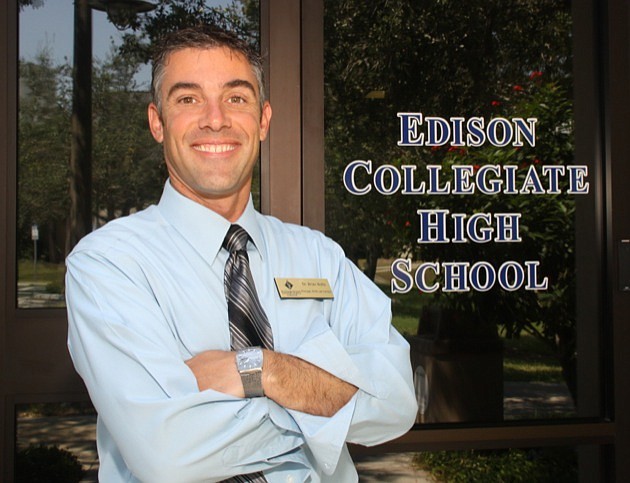- November 26, 2024
-
-
Loading

Loading

Edison Collegiate High School in Fort Myers is barely a year old, but 300 students applied for 100 openings in its freshman class this year.
This strong demand should be good news for Lee County employers and specialty manufacturers in particular. That's because Edison Collegiate is a charter school that emphasizes science, technology, engineering and math, a so-called STEM school by the subjects' initials.
Employers clamor for students with math and science skills, but more than anything they want new employees who can work well with others to solve technical problems. Brian Botts, the school's 40-year-old principal, says he recently spoke with a manufacturer in Cape Coral who wanted young job applicants to have more than just computer skills. He wants them to have the ability to “fit in with the guys” at the plant.
Botts started the school's curriculum from scratch, using free course materials from the Massachusetts Institute of Technology, for example. Instead of the traditional textbooks, students study for class via their own iPads. There are other STEM schools on the Gulf Coast, but Botts says there's no pre-established curriculum or parent organization like the International Baccalaureate.
Because it's a charter school, Edison Collegiate receives state funding but has more freedom to determine its curriculum. It received a $325,000 startup capital grant that allowed the school to buy the latest technology.
Students work in collaborative groups to solve problems together, and teachers emphasize lab work. For example, after just five weeks of school, students in biology already finished 14 lab projects together.
Botts says Edison Collegiate doesn't “play school,” where teachers lecture, students take notes and regurgitate the material on a test. For example, freshman students recently finished a project that involved building a rubber band powered car that could travel at least six meters. Only a third of the class succeeded and the rest of the class got a zero and had to start over. “You've got to make it work,” Botts says, much like employers would hold employees accountable. “We don't let kids off the hook.”
Themes cut across all classes. For example, students learned about the Greek hero Odysseus in art, history and engineering, building miniature boats in one project. “It helps them make connections,” Botts says. “We try to let science lead the way.”
The small-school setting makes interconnections between subjects and small-group learning possible, Botts says. “Everything is done collaboratively,” he says, pointing to the group tables in classrooms and whiteboard walls. There are no individual desks and chairs and there are just five teachers. Every Wednesday, students have lunch with the principal.
The school leases space in a new $3 million building at Edison State College and will have 100 students per high school grade. Now in its second year, it has freshmen and sophomores. “Last year, we were a four-room schoolhouse,” Botts chuckles.
One of the bonuses of attending Edison Collegiate is that if students finish their sophomore year with a 3.0 grade average or higher, they can take courses at Edison State College and graduate high school with a two-year college degree.
While students at the school come largely from a self-selected group of motivated kids (the school's freshmen last year had the 16th highest scores on the state standardized test in reading), Botts says some can barely read when they arrive the first day. Still, Botts says he's proud of the fact that those students made some of the biggest gains in their first year.